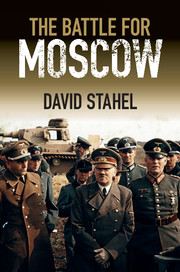Book contents
- Frontmatter
- Contents
- List of illustrations
- List of maps
- List of table
- Acknowledgements
- Glossary
- Tables of military ranks and army structures
- Introduction
- 1 Parallel wars
- 2 The idle Typhoon
- 3 Preparing the final showdown
- 4 The Orsha conference
- 5 Typhoon re-launched
- 6 The long road to Moscow
- 7 Victory at any price
- 8 The frozen offensive
- 9 Down to the wire
- 10 To the gates of Moscow
- Conclusion
- Notes
- Bibliography
- Index
1 - Parallel wars
Published online by Cambridge University Press: 05 February 2015
- Frontmatter
- Contents
- List of illustrations
- List of maps
- List of table
- Acknowledgements
- Glossary
- Tables of military ranks and army structures
- Introduction
- 1 Parallel wars
- 2 The idle Typhoon
- 3 Preparing the final showdown
- 4 The Orsha conference
- 5 Typhoon re-launched
- 6 The long road to Moscow
- 7 Victory at any price
- 8 The frozen offensive
- 9 Down to the wire
- 10 To the gates of Moscow
- Conclusion
- Notes
- Bibliography
- Index
Summary
Degrees of separation: the eastern front, 1914 and 1941
While Germany’s eastern front in the Second World War is known for its enormous scale and unprecedented bloodletting, it is also significant that the conflict was prefaced only a generation before by another war, which accounted for millions more German, Austrian and Russian casualties. Indeed, no two countries have killed more of their opposing citizens than Germany and Russia. On the eastern front in the First World War, the combined number of German and Russian dead and missing (excluding all other nationalities) amounted to some 2.75 million men (750,000 Germans and 2 million Russians). In spite of this imposing figure, in December 1940 Hitler set Germany on course to attack the Soviet Union, but not out of fear of the power of his rival in the east; it was precisely because he believed it could be carried through easily in one swift campaign. Hitler’s eye was on the plentiful mineral and oil riches, the vast fields of fertile earth and the abundant access to human labour, which could free him forever from Britain’s continental blockade and provide the building blocks to a new autarkic German economy destined for world power status. Hitler had long prophesied the acquisition of Lebensraum (living space) in the east, and it was the short-lived German victory over Russia in the First World War that provided the precedent. In 1918, the newly created Soviet Union ceded 1.4 million km2 of land, including the Baltic states, parts of Belorussia and Ukraine, to Germany in the Treaty of Brest-Litovsk. Yet, while Hitler and his generals were inclined to focus on the ultimate defeat of the Russians in the First World War, they ignored the fact that Russia had fought tenaciously for over three years against Germany and its allies, the Austro-Hungarian and Ottoman empires. Indeed, the German High Command of 1940–1 was influenced by a so-called ‘Tannenberg myth’, which contrasted a natural German military superiority with barbaric Russian hordes. This not only reflected racial and cultural prejudices that impacted upon German behaviour in the east, but also pervaded their military plans and led to baseless assumptions that the war could be won in the initial border battles.
Information
- Type
- Chapter
- Information
- The Battle for Moscow , pp. 11 - 51Publisher: Cambridge University PressPrint publication year: 2015
